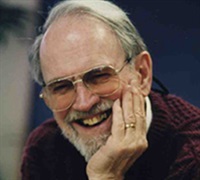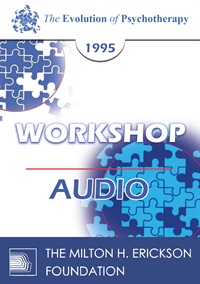EP95 Workshop 11 - Searching: Enlisting the Life Force in Psychotherapy - James F. T. Bugental, PhD
- Average Rating:
- Not yet rated
- Topic Areas:
- Workshops | Psychotherapy | Resistance | Therapeutic Relationship | Therapist Development
- Categories:
- Evolution of Psychotherapy | Evolution of Psychotherapy 1995
- Faculty:
- James Bugental, PhD | David Young, Ph.D. | Molly Sterling, Ph.D.
- Duration:
- 1 Hour 28 Minutes
- Format:
- Audio Only
- Original Program Date:
- Dec 13, 1995
- License:
- Never Expires.
Description
Description: This workshop invites therapists into a different stance toward psychotherapy. Through teaching, small-group exercises, and live demonstration, it reframes therapy as clearing the way for the client’s own life force to emerge. Emphasizing presence, resistance, and moment-to-moment awareness, the session challenges clinicians to shift from solving problems to helping clients recognize and move beyond the “spacesuits” that limit their vitality.
Syllabus Description: The client's task is to try to be open to his/her inner experiencing, disclosing it to the therapist. A client discovers difficulties in doing so, thus disclosing the resistances which are isomorphic with the client's difficulties in life more generally. The therapist's task is to teach and monitor this process.
Educational Objectives:
- To describe clinical use of the interrelations among concern, searching, resistance and therapeutic change.
- To identify resistances for the client in such a way as to foster recognition and productive response.
*Sessions may be edited for content and to preserve confidentiality*
Credits
Faculty

James Bugental, PhD Related Seminars and Products
James Bugental, PhD, was one of the predominant theorists and advocates of the Existential-Humanistic Therapy movement. He received his Ph.D. from Ohio State University in 1948, was named a Fellow of the American Psychological Association in 1955, and was the first recipient of the APA's Division of Humanistic Psychology's Rollo May Award. James devoted himself to teaching and writing; he was also an Emeritus Professor, Saybrook Institute, and an Emeritus Clinical Lecturer (formerly Associate Clinical Professor), Department of Psychiatry, Stanford University Medical School. In 1987, he was the recipient of the first annual Rollo May Award of the Mentor Society "for contributions to the literary pursuit," and in 1986, he received a certificate "in recognition of the distinguished contribution to the discipline of Clinical Psychology" from the Division of Clinical Psychology, American Psychological Association. He was a past president of the Association for Humanisitic Psychology and served on the editorial boards of eight professional journals. Bugental has written 150 articles, reviews, comments, and chapters in books edited by others.


